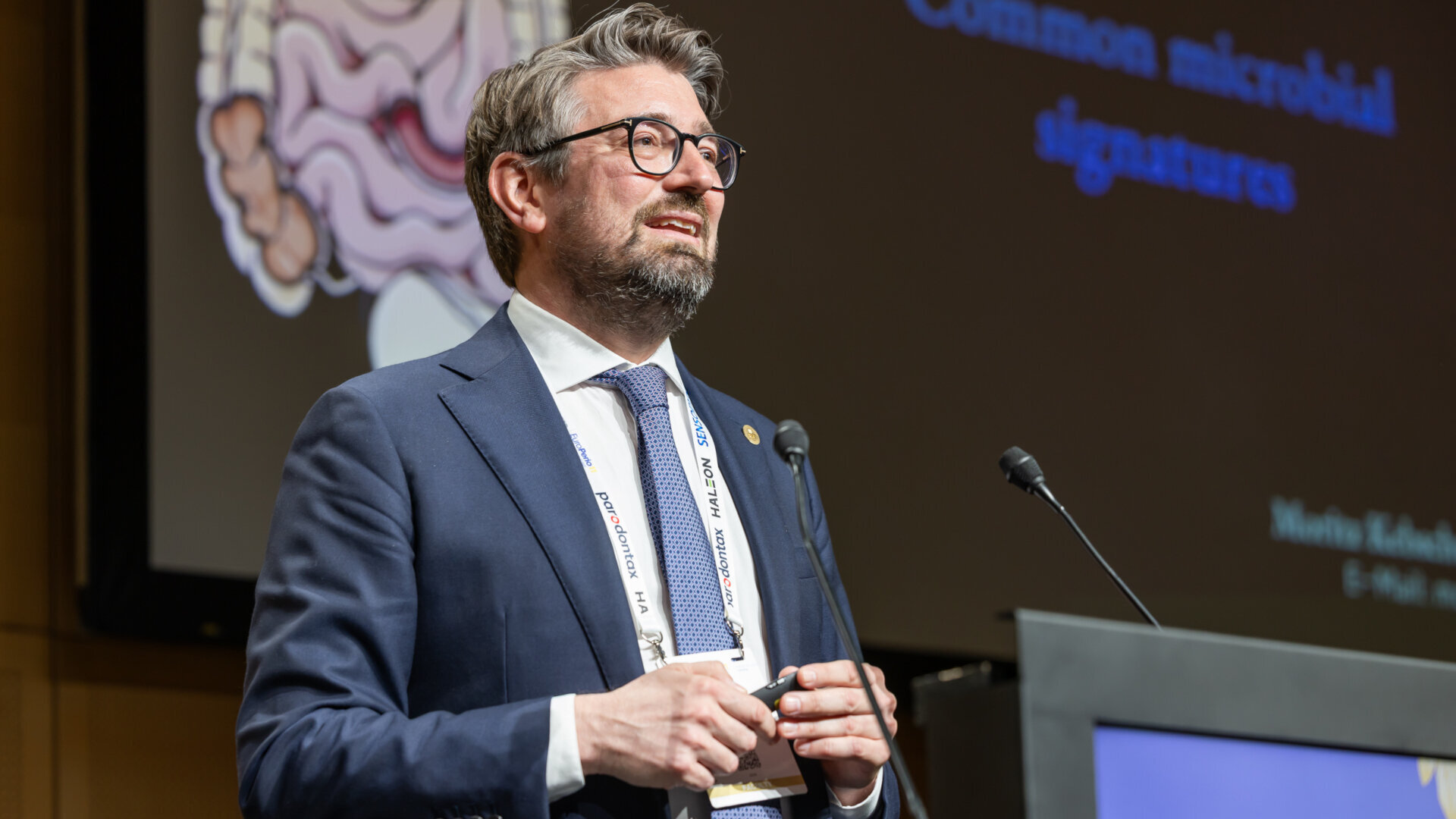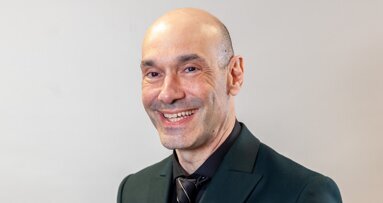As the global conversation around oral health continues to evolve, the European Federation of Periodontology (EFP) is playing an increasingly influential role—both within the dental profession and on the wider healthcare policy stage. At EuroPerio11 in Vienna in Austria, Dental Tribune International spoke with Prof. Moritz Kebschull, past president of the EFP, about the federation’s ongoing growth and its expanding global impact. In this interview, Prof. Kebschull reflects on key achievements during his term, including the development of clinical guidelines, advances in education and vocational training, and the EFP’s growing influence on public health policy. He also shares his outlook on the future of periodontics and the strategic direction needed to sustain the federation’s momentum.
Prof. Kebschull, during your presidency of the EFP, substantial progress was made in areas such as clinical practice guidelines, education and research. Looking back, what do you regard as the most significant achievements of your term?
If I had to summarise my most significant achievements as president in one word, it would be impact. Today, the EFP is focused on creating impact that goes beyond the traditional remit of a learned society. We are moving past simply hosting congresses, publishing research or developing educational materials. Our goal is to influence policymakers, stakeholders, governments and regulatory bodies—not only in Europe but globally.
A key milestone was our contribution to shaping policy through clinical guidelines and position papers. This culminated in the World Health Organization’s global oral health conference, held in November 2024 in Bangkok in Thailand, during which oral disease was formally and globally recognised as one of the major non-communicable diseases. That recognition—enshrined in the Bangkok Declaration—marked a truly historic and meaningful moment for the entire dental and implantology community and, most importantly, for our patients.
How is the growing body of evidence on the economic and public health benefits of investing in oral health influencing healthcare policy and shaping prevention strategies?
There is an ongoing series of initiatives contributing to the growing body of evidence that shows that investing in oral health leads to a significant reduction in overall healthcare costs. This is largely due to the preventive nature of oral care and its well-established link to systemic health.
Many dental conditions are relatively easy to prevent and treat. By addressing these issues early, we can help avoid hospitalisations, long-term illness and absenteeism in the workforce. This has a profound economic impact—reducing costs for governments, healthcare providers and society at large—while also improving patients’ quality of life. In short, investment in oral health is both clinically and economically worthwhile.
How has the EFP succeeded in making its voice heard by policymakers, and what role has evidence-based advocacy played in that process?
I believe that we’re doing quite well in that regard. Naturally, it is not straightforward for a learned society to gain the attention of institutions like the European Parliament, but this is something we’ve become increasingly adept at. We’ve made strategic investments to support this effort—particularly by producing credible, high-quality evidence that policymakers care about. For example, our second white paper, titled Time to Put Your Money Where Your Mouth Is: Addressing Inequalities in Oral Health, was presented to the European Parliament in Brussels in Belgium.
“Today, the EFP is focused on creating impact that goes beyond the traditional remit of a learned society.”
Prof. Iain Chapple, who was my former boss and a mentor to me, once asked, “Why do you spend so much time working on the guidelines? You could be publishing more scientific papers.” I replied: “Where is the British version of the EFP guidelines?” He said, “It’s on the government website.” To which I responded: “Exactly. How many other things that we’ve done have made it to a government website?” His answer: “None.”
This illustrates the impact of evidence-based advocacy. We’re producing work that politicians take seriously. In both Germany and the UK—where I’m most active—we’ve already secured significantly increased funding for periodontics, and we’re seeing real improvements for patients and practitioners alike.
One of your key priorities has been to strengthen education through vocational training and support for young researchers. How has the EFP advanced in these areas under your leadership, and why do you consider them vital for the future of periodontal care?
Becoming a specialist in periodontics typically requires full-time training. The EFP currently accredits 24 postgraduate programmes worldwide. However, many countries still face a shortage of specialists—and the need for specialist care is growing. That is why we are actively exploring ways to upskill and train dental professionals to provide high-quality periodontal treatment. One important initiative is the Bruges–Copenhagen Process, a European vocational education and training scheme focused on upskilling and reskilling the existing workforce. There are several such programmes under way, and the EFP is considering accrediting these in the future and helping to define what high-quality vocational training looks like.
It is important to recognise that not every aspiring periodontist is a 26-year-old recent graduate entering a full-time specialist programme. Some might be mid-career dentists—perhaps in their 40s—who now wish to specialise in periodontics. They might choose to complete a part-time master’s degree over three or four years, achieving a Master of Science in periodontal therapy. While this wouldn’t equate to the same level of expertise as a full-time specialist, it would bring them well above the capabilities of a general dentist.
The EFP views this approach as highly relevant and necessary. We need more trained professionals, and our aim is to support the development of this third pillar of periodontal education—vocational training. This pathway could also apply to dental hygienists seeking advanced skills. The opportunities are wide-ranging, and we believe that the Bruges–Copenhagen Process model represents a promising future for periodontal education.
As you pass the baton to your successor, what is your outlook for the EFP’s future? What challenges and opportunities do you see ahead for the federation and the broader field of periodontics?
I believe that the future of the EFP is extremely bright. As you can see at EuroPerio11, we enjoy significant visibility, we’re hosting a fantastic congress and we’ve attracted a large and truly international audience.
The EFP is evolving—from a Europe-focused organisation to one with a global outlook and growing international influence. Our impact now extends not only to our professional colleagues but also to patients and policymakers around the world.
The key challenge lies in managing this growth in a coherent and strategic way. That’s why we need to implement a new strategy—one that keeps oral health and measurable impact at the heart of everything we do.
Editorial note:
More information about the European Federation of Periodontology can be found here.
Topics:
Tags:



 Austria / Österreich
Austria / Österreich
 Bosnia and Herzegovina / Босна и Херцеговина
Bosnia and Herzegovina / Босна и Херцеговина
 Bulgaria / България
Bulgaria / България
 Croatia / Hrvatska
Croatia / Hrvatska
 Czech Republic & Slovakia / Česká republika & Slovensko
Czech Republic & Slovakia / Česká republika & Slovensko
 France / France
France / France
 Germany / Deutschland
Germany / Deutschland
 Greece / ΕΛΛΑΔΑ
Greece / ΕΛΛΑΔΑ
 Hungary / Hungary
Hungary / Hungary
 Italy / Italia
Italy / Italia
 Netherlands / Nederland
Netherlands / Nederland
 Nordic / Nordic
Nordic / Nordic
 Poland / Polska
Poland / Polska
 Portugal / Portugal
Portugal / Portugal
 Romania & Moldova / România & Moldova
Romania & Moldova / România & Moldova
 Slovenia / Slovenija
Slovenia / Slovenija
 Serbia & Montenegro / Србија и Црна Гора
Serbia & Montenegro / Србија и Црна Гора
 Spain / España
Spain / España
 Switzerland / Schweiz
Switzerland / Schweiz
 Turkey / Türkiye
Turkey / Türkiye
 UK & Ireland / UK & Ireland
UK & Ireland / UK & Ireland
 Brazil / Brasil
Brazil / Brasil
 Canada / Canada
Canada / Canada
 Latin America / Latinoamérica
Latin America / Latinoamérica
 USA / USA
USA / USA
 China / 中国
China / 中国
 India / भारत गणराज्य
India / भारत गणराज्य
 Pakistan / Pākistān
Pakistan / Pākistān
 Vietnam / Việt Nam
Vietnam / Việt Nam
 ASEAN / ASEAN
ASEAN / ASEAN
 Israel / מְדִינַת יִשְׂרָאֵל
Israel / מְדִינַת יִשְׂרָאֵל
 Algeria, Morocco & Tunisia / الجزائر والمغرب وتونس
Algeria, Morocco & Tunisia / الجزائر والمغرب وتونس
 Middle East / Middle East
Middle East / Middle East





































To post a reply please login or register